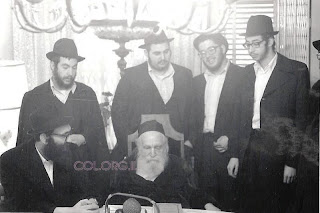
Circus Tent: Shluchim running marathons; am I out of touch?
Dear Hirshel,
I came across your blog recently when executing a google search about Rabbi Peretz Chein, of Chabad at Brandeis University (Waltham, MA) and his fairly completion of a marathon. I wanted to take a moment to express to you why I disagree with the content of your post:
Even had Rabbi Chein's sole motivation in running the marathon
been to instill in his students the value of exercise, this would be
more than a worthy endeavor. We are commanded by Hashem to take care of our bodies by maintaining our health. Every doctor will tell you how important it is to exercise on a regular basis, so as to prevent heart disease,stroke or countless other problems (G-d forbid), yet I hardly know of a Rabbi or Jewish educator who takes this mitzvah seriously. More often, we neglect exercise in the name of "more important" mitzvot. This lifestyle of cholesterol and imbibing calories rather than burning them is hypocricy. It is a blatant error that should be obvious, and usually is acknowledged, in theory, those times that I have ever confronted anyone. (If someone dies at 60 from a heartattack, because they neglected their health during their life, how is this not going to be viewed by Hashem in some way as a form of suicide?)
The value of exercising on a regular basis would have been a more than worthy purpose of Rabbi Chein's marathon. However, this was not even the crux of Rabbi Chein's message! You missed the larger picture, even while alluding to it in your post. I am a recent graduate of Brandeis University and had personal contact with Rabbi Chein as he was preparing for the marathon. The primary message that he sought to instill in his student's was this: nothing is impossible. To a man that had not participated in organized sports since he was age 13, to complete a marathon within the year was literally almost impossible. Yet he persevered.In doing this he demonstrated to his students that nothing is impossible. As Rabbi Chein once put it, he asks his students to push their limits, to "do the impossible" all the time, and now he was showing us that that it can be done, and that we can do it.
He showed that all of us can do that which we think may not be possible. We
really can commit to observing Shabbat, to learning Torah every day, to
attending a regular Torah class, even to attending a single Shabbat meal, to be mekarev, in some small way, yidden around us,...even when we never thought we had it in us. Nothing is impossible, not after the Rabbi ran a marathon. I don't think there could be a more worthy, beautiful, "Torahdik" and "Chabad" message than that. Finally, regarding your comment about his looking like a "spaceman" during the race, I don't see it. But regardless, I am certain that Rabbi Chein would look like a "space man" again in a heartbeat, and anytime, if that is what it would take to hammer home this beautiful message to even one more of his students. Shouldn't every shliach? A view that his example was anything other than positively inspiring is, yes, simply "out of touch."
-Robert Friedman
St. Louis, MO
_________________________
Robert Friedman Tennis
rftennis@yahoo.com





















%5B1%5D.JPG)











